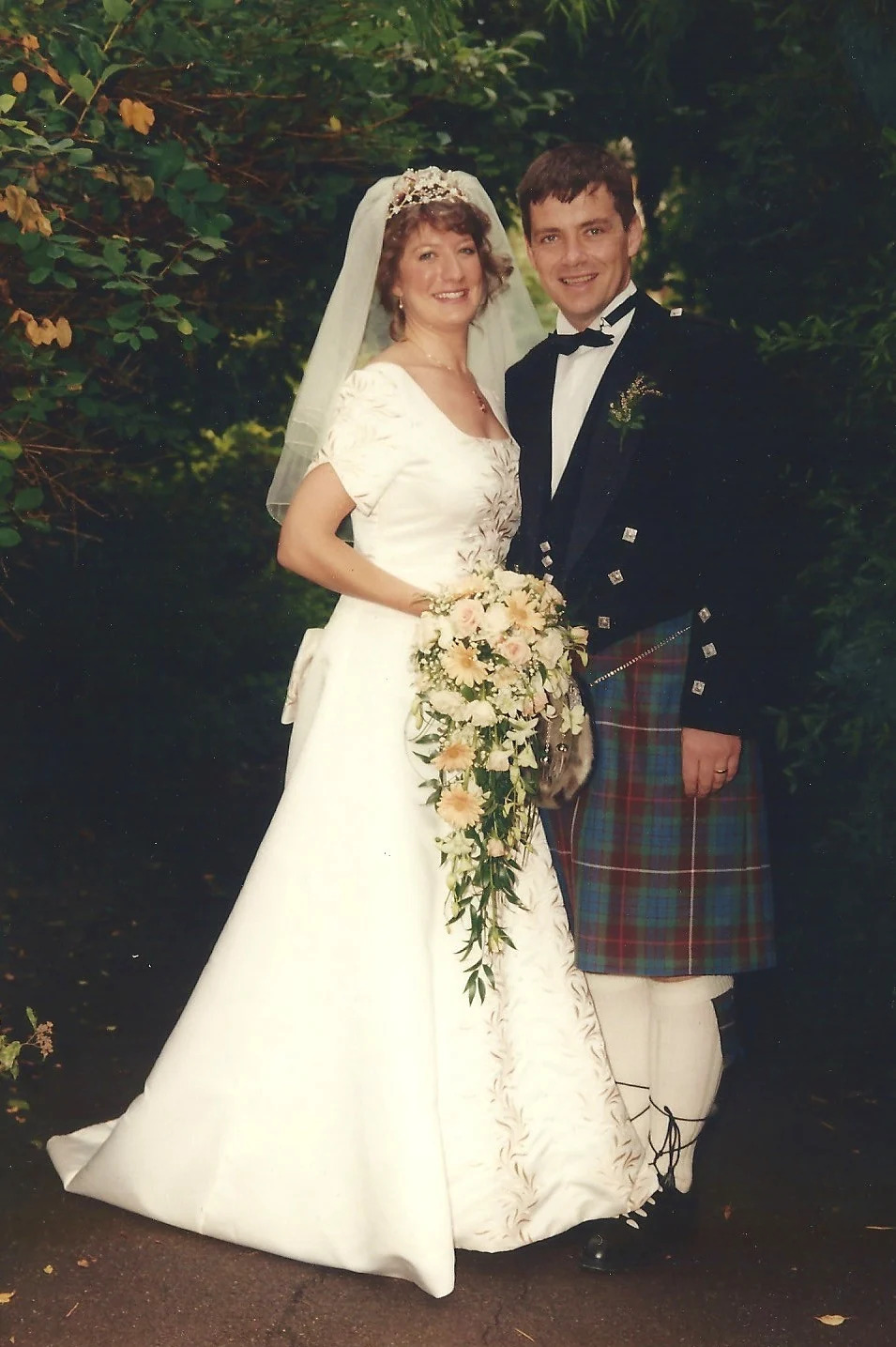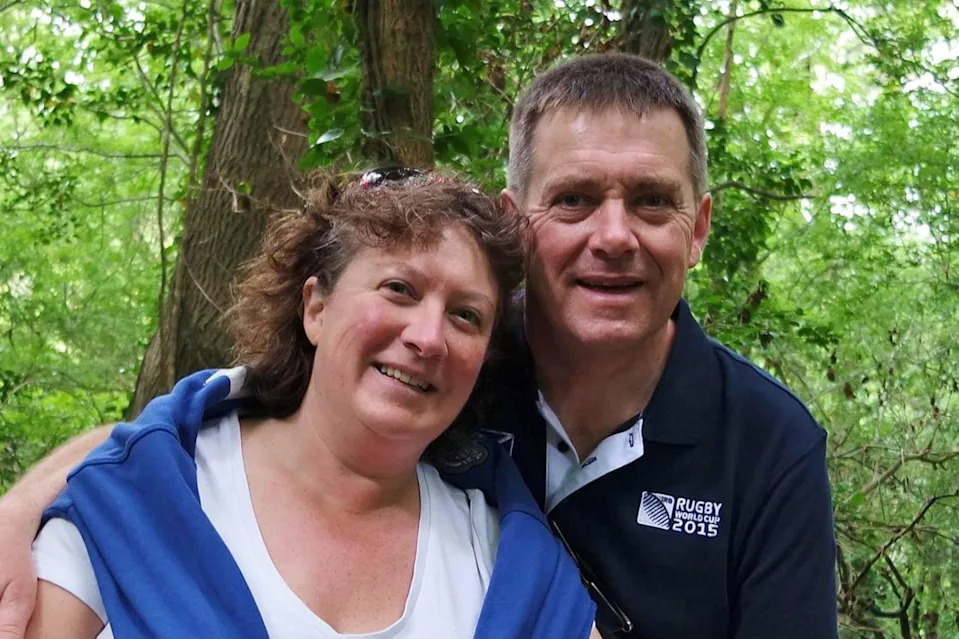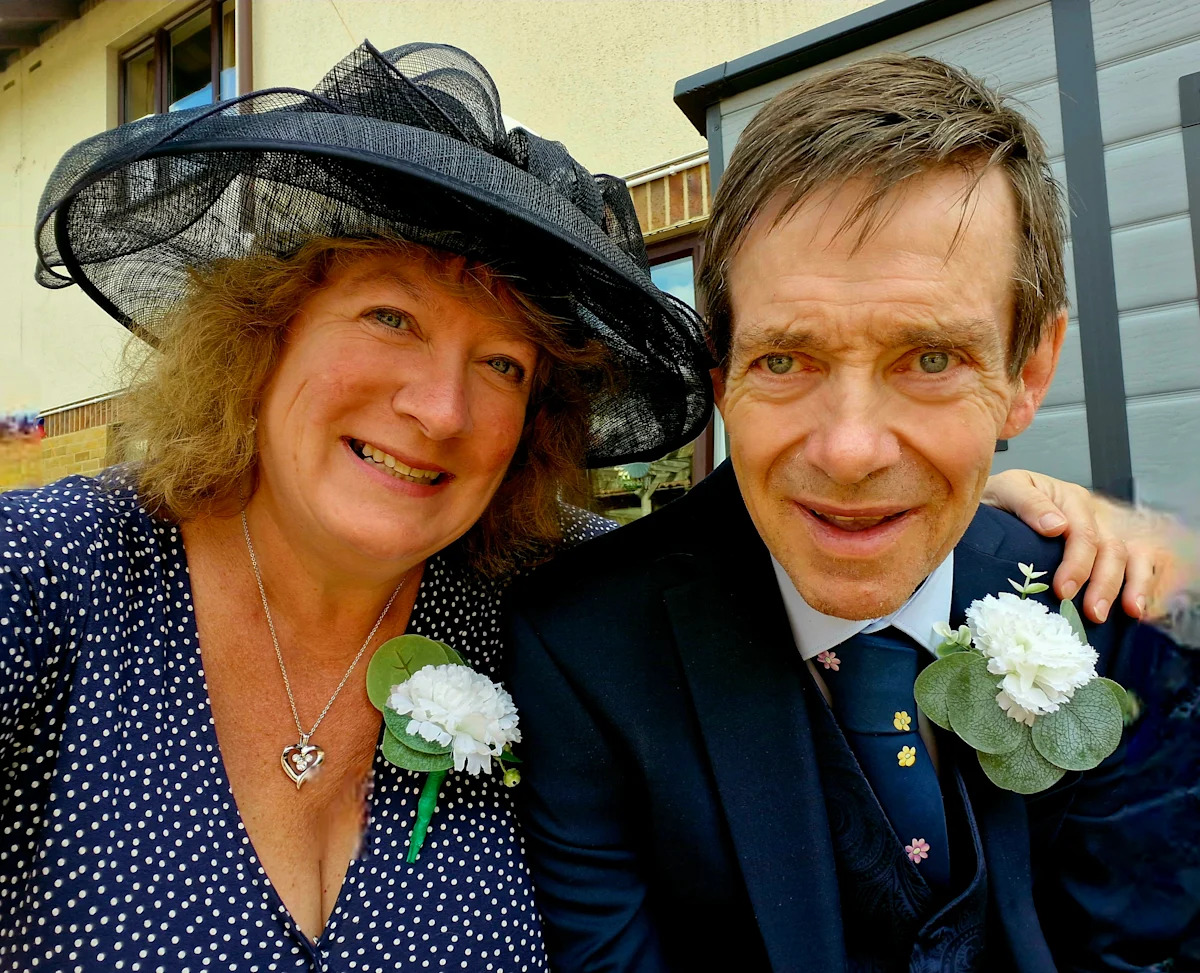Taking my husband Ian to his weekly ‘Singing for the Brain’ session, run by our local Alzheimer’s Society, our assigned dementia adviser could tell straight away that something was wrong.
Ian was confused, and I was clearly upset. I had completely run out of steam, wondering how on earth I could help him.
Immediate respite care in a dedicated facility was suggested, and it was such a relief. I don’t really think I could have made the decision myself. She arranged for an assessment the following day, and I realised it was 30 years to the day since our first date.
Ian was confused and I was clearly upset. I had completely run out of steam, wondering how on earth I could help him.
Ian and I first met in 1992 when he joined the amateur dramatics group in my home town of Bath. He was lovely – caring, considerate, supportive – and he didn’t take himself too seriously.
I fell for him far too quickly, but as a student, I was reluctant to get involved until I’d finished my studies. Ian totally understood and quietly waited in the wings.
I graduated in the summer of 1994, and we had our first ‘proper’ date on 17 October that year. I’d have married him there and then if he’d asked! But he proposed the following year and we married in August 1996.
Our daughter was born a few years later, and the arrival of our son, a couple of years after that, completed our family.

Katrina and Ian married 29 years ago in 1996. (Supplied)
We both worked full-time until the children came along, then I reduced my hours. We shared nursery and school pick-up and drop-off duty, and the children loved it when he turned up on his motorbike to collect them.
Ian took early retirement from the Ministry of Defence, where he worked as a naval architect, in 2018. The plan was to have six months off, then try to find something with less pressure. Then COVID hit, and everyone went into lockdown.
Struggling to get a diagnosis
It was at the start of 2022 that I noticed Ian was slowing down and seemed out of sorts. He was walking much more slowly and becoming over-anxious. He was weaker and losing weight, despite his eating habits and exercise routines remaining unchanged.
He struggled to play bowls, and was asked to stop playing competitively – something he had always loved to do. Having that taken away had such an effect on him and he became very withdrawn.
I requested a GP appointment in June 2022, where depression was diagnosed. Antidepressants were prescribed, but they made no difference. We arranged several follow-up appointments, and each time we were assured that it was depression.
But by 2023, after many cancelled appointments and numerous tests, a consultant neurologist confirmed significant signs and symptoms of the progressive neurological condition Parkinson’s. With a reduction in mobility and motor coordination, Ian was immediately prescribed Parkinson’s medication.
I requested a GP appointment where depression was diagnosed. We arranged follow-up appointments, and each time we were assured it was depression.
By September of that year, he was unable to cut up food, do up zips or buttons, and could no longer operate household devices like the TV or the cooker. He had lost over three stone in 12 months.
A follow-up appointment in February 2024 confirmed rapidly progressive Parkinsonism and young rapid-onset dementia.
An incredibly stressful time
Ian began to struggle to follow conversations in a noisy environment and to think of the right words to say quickly enough to join in. He became reluctant to engage in conversation outside of the family.
He initially didn’t want anyone to know about his diagnosis, so we became very isolated from friends and the wider family, as we struggled to come to terms with what was happening. We had no support and no idea how to manage day-to-day tasks.

Ian initially didn’t want anyone outside the immediate family to know about his diagnosis. (Supplied)
He lost all his confidence and wouldn’t leave the house on his own, even to walk the dog. I arranged a ‘sitting service’, where people would come in for a few hours at a time, and take Ian out for a walk or a coffee, to break up his day while I worked.
I was trying to keep my job in project delivery going during this time; fortunately, my employer, Aviva, has been incredibly supportive and allowed me to work from home, so Ian was never left alone.
Ian’s decline was rapid. He was unclear who I was. He thought his wife had left him, and I’d been brought in as a carer.
But within a few months of diagnosis, Ian was struggling to have a conversation. He could only focus on things that directly impacted him, seeking reassurance and reminders for anything involving him.
Ian’s decline was rapid. By April 2024, he was unclear who I was. He thought his wife had left him and I’d been brought in as a carer. He became uncomfortable sharing a room with me, as he thought his (our) children would think badly of him. So, I moved into the spare room to avoid distressing him further.
As the year progressed, he became increasingly disoriented – unable to recognise our family home and growing increasingly confused.
Getting support
By October, I finally accepted that Ian needed far more support than I could give. I arranged for carers to help in the mornings, but this really didn’t work for us. Ian felt hurried and confused by the carer’s arrival, which seemed out of the blue, and he became very distressed. I had no idea what to do to help him.
That was when I went to the Singing For The Brain session, and we were referred for an assessment. It was absolutely heartbreaking. I felt that I had failed him, that I had let him down by not being strong enough to provide for him at home.
But I also knew it was the best thing for Ian. All I ever wanted was to do the best for him and ensure he received the care and support he needed and deserved. I know I couldn’t give him that myself.
I had been assigned a dementia specialist, Admiral Nurse from Dementia UK, in June, who was able to talk me through coping mechanisms and help me understand the medical jargon. A few months later, I was offered a Dementia Support from Alzheimer’s Society.
Both have been by my side throughout, and their support was unwavering when Ian moved into care. They gave me reassurance that this was the right thing for Ian, and they have continued to show incredible care and empathy as I’ve tried to come to terms with what has happened.
Making memories together
As soon as Ian moved into care, he remembered who I was again. He became far less stressed and settled in so quickly. He became more sociable and really enjoyed chatting with staff and other residents. I was able to take a step back, knowing that he was getting the professional support he deserved.
Once I knew he was getting the care and support he needed, I was able to start putting myself back together again and helping our children to face the future.
As soon as Ian moved into care, he remembered who I was again. He became far less stressed and settled in so quickly.
Respite turned into permanent care. Ian was very settled, and it seemed wrong and selfish to unsettle him again by bringing him home, just to ease my own guilt.
As his dementia progressed, we moved to a nursing home which was better able to manage his increasing needs. This will be his forever-home, and it is a wonderful place – vibrant, colourful, with activities and trips out to ensure he leads as full a life as possible, while he can.
The feeling of guilt will always remain, but I have to accept that I could never give the level of care that he now needs. He is my husband, and I’m grateful that I can now spend quality time with him.
When I visit, he is my sole focus, without trying to juggle the pressures of daily life around him. I spend as much time with him as I can, and get involved in the activities so we continue to have good times together and make memories.
Help and support for families living with dementia or Parkinson’s
Dementia UK – for help or support, visit dementiauk.org. You can call the helpline on 0800 888 6678 or email helpline@dementiauk.org.
Alzheimer’s Society – visit alzheimers.org.uk. Call the Dementia Support Helpline on 0333 150 3456.
Parkinson’s UK – visit parkinsons.org.uk. Call the helpline on 0808 800 0303 or email hello@parkinsons.org.uk.
Read more about dementia and Parkinson’s:

